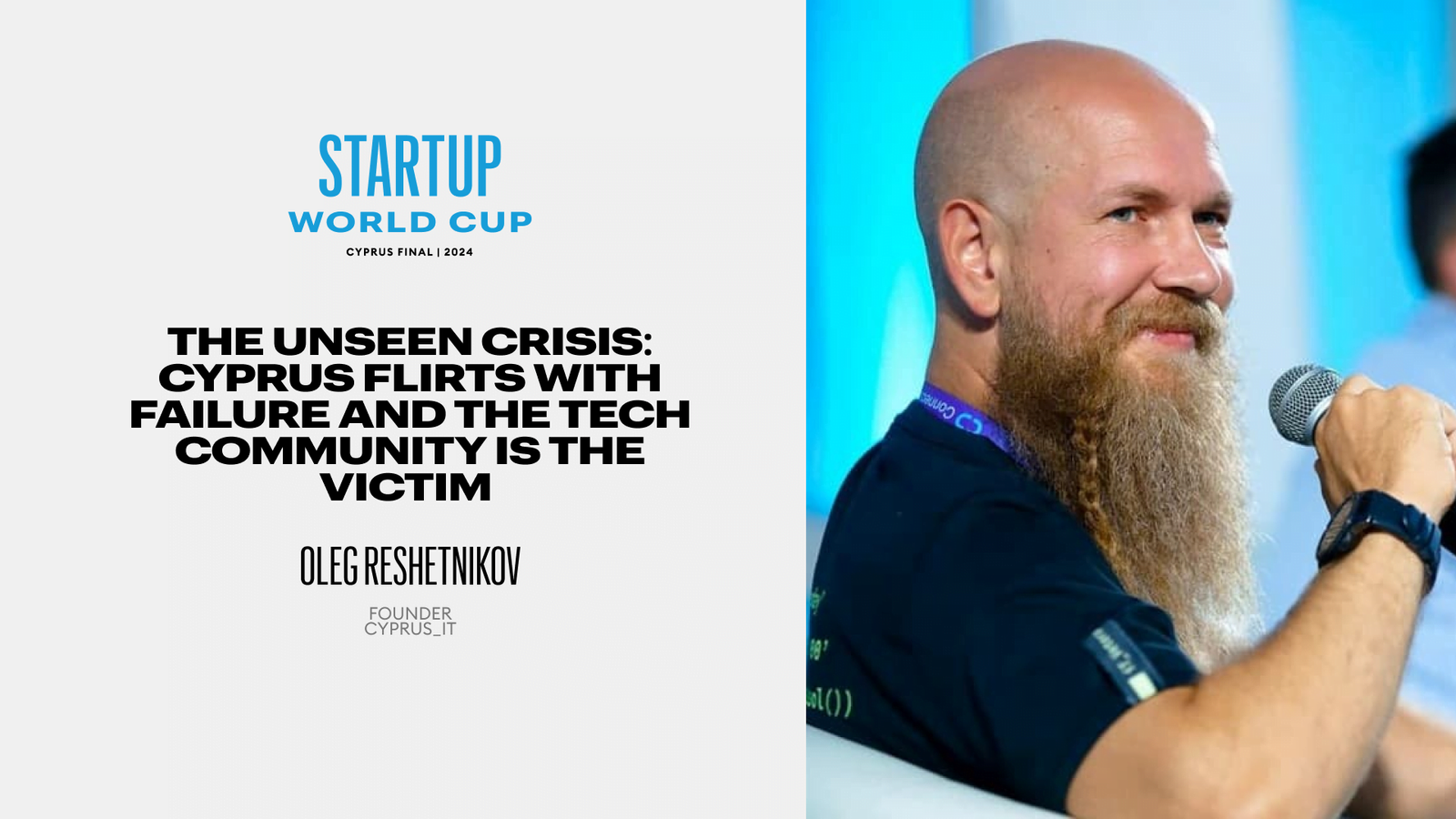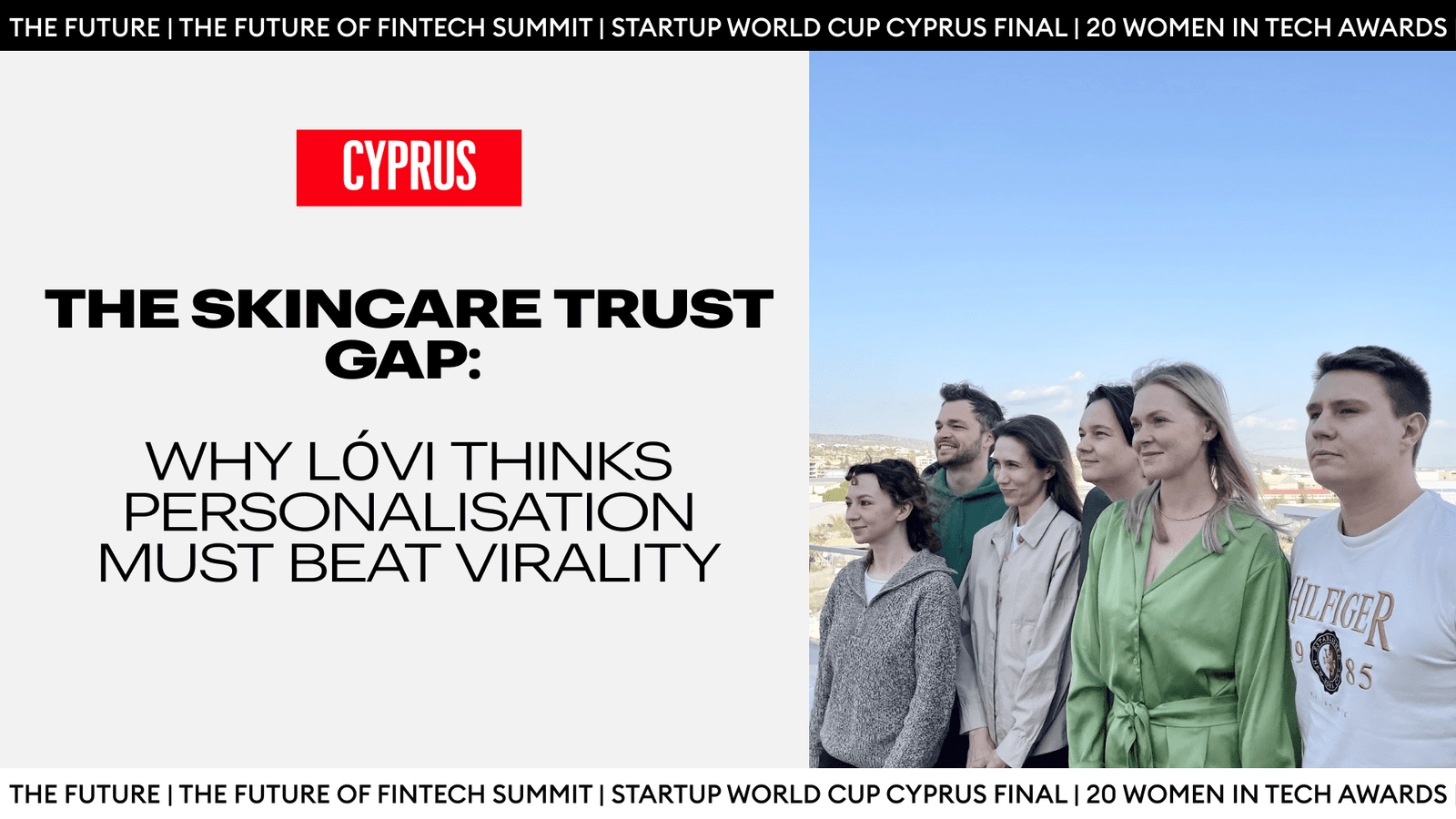We partially borrow the title from a series of posts by Oleg Reshetnikov, founder of Cyprus_iT, “The Unseen Crisis”, to unravel a very important issue that has a direct and indirect impact on both the local tech community and the Cypriot economy.
In one of his many posts, Mr Reshetnikov sadly observes that “Cyprus is gradually obstructing its technological and startup future. New regulations, laws, and decrees are rendering the country increasingly unappealing to students, freelancers, digital nomads, and emerging entrepreneurs—all of whom operate outside large corporations and have the potential to create and build innovative projects and attract investments to this sunny island”.
Follow THE FUTURE on LinkedIn, Facebook, Instagram, X and Telegram
But let’s dive into this part by part, as Mr Reshetnikov gave permission to The Future and tell this story.

Problem 1 – Potential loss of students
Mr Oleg starts with the first problem which affects the universities in Cyprus, as he states in his post, “ιn 2024, Cyprus’s private universities might lose students from expat families. The reason behind this is the new ‘talent’ citizenship law”.
First of all, he acknowledges, that universities in Cyprus have high educational standards, with plenty of choices for the children of the foreigners who live on the island and there’s a solid research base. With the required paperwork done, the children of these families can switch their dependent residence permit for a student one as Cyprus’s migration authority demands and study in one of the universities in Cyprus.
“But that was before” Mr. Oleg underlines as everything changed in late 2023. The government passed amendments to the citizenship law, to make it easier for high-skilled specialists in foreign-owned companies, to get Cypriot citizenship. “Now, they can apply for Cypriot citizenship after just 5 or 4 years, depending on their Greek language proficiency level” he adds.
“But how does this impact students? Directly, it doesn’t. However, since the citizenship law was amended, parliament decided to tweak it further to make it ‘more correct’. For example, they added a Greek language requirement for regular naturalization. And, they decided student residence permit time wouldn’t count towards citizenship eligibility” he notes
With these new developments, a student at a Cypriot university must get a student residence permit and can no longer count this time towards citizenship and “they must finish their studies and then start accumulating the required residency years from zero”. Even though, the student and the family have been living in Cyprus for the past few years.
For Mr Reshetnikov, there is a dilemma for the families. On one hand, families can choose to send their child to study in one of the universities in Cyprus, but the student loses the residence permit to get a different one, and on the other hand, the family can send the child to study abroad. “This way, they can remain a dependent on your residence permit, even past 18, as long as they visit Cyprus every 90 days to maintain the permit’s validity” he clarifies.
Mr Reshetnikov hopes that this amendment is just a regrettable mistake and that the necessary corrections will be made in the next parliamentary sessions.
“If things stay the same and the law comes into effect without any changes, not only will private universities in Cyprus lose a portion of their students from expat families, but the Republic of Cyprus will also miss out on ‘new talents’ who could have become engineers, educators, entrepreneurs, startup founders, developers, and researchers on the island”.
For Mr Reshetnikov the solution to this problem lies with the Migration Authorities and it is quite simple. The community requires not to change the citizenship law, but to allow the children who live in Cyprus as dependants with their parents to be able to study in universities of the island with a dependent’s visa.
“And this decision is to be communicated to the universities. “According to different lawyers, the Migration is not against it. They just need a formal document from that and it is necessary to take into account the past period of such students, when they studied in Cyprus on student residence permit” he clarifies.
Problem 2 – Expats in One Basket: Paying or Receiving, No Difference
In the second part of “The Unseen Crisis”, Mr Reshetnikov, focuses on the future of tech and startups and Cyprus seems to have closed the doors to them.
“Cyprus is gradually distancing itself from digital nomads, freelancers, and startup founders from third countries, potentially curtailing the growth of its tech and startup sectors. These digital nomads and IT freelancers represent a rich breeding ground for innovation and can significantly attract investments” he explains.
It’s clear that the foreigners who live in Cyprus, contribute to the economy of the island in various ways, through taxes, shopping, rents and many other streams.
“However, the past two years have seen a worrying trend: many ‘visitors’ who pay taxes in Cyprus, including business owners and remote company employees, face rejections when renewing their residency” he notes.
Rejections have become more frequent, leading to fewer “visitors”, as Mr Reshetnikov identifies them. But they are something more than visitors. “People who have built their lives in Cyprus suddenly find themselves with a letter giving them 30 days to leave, usually received well after it was sent” he underlines.
“Why this change?” Mr Reshetnikov wonders as officially, the rules haven’t altered, but their interpretation has become stricter.
“Previously, if there were doubts about documents or bank statements, inspectors would request further clarification. Now, any uncertainty leads directly to rejection” he explains.
The whole situation has created a feeling of uncertainty between those who live in Cyprus and consider the island their home. Others may want to check their options for relocating.
The underlying issue is the migration policy’s failure to distinguish between economically contributing visitors and others. In trying to protect the local economy from perceived threats, the policy inadvertently drives away those who invest and enrich Cyprus
Various solutions have been discussed in the circles of the tech community. Mr. Reshetnikov highlights some ideas:
- Clearly define the list of documents and requirements for obtaining/renewing “visitor” residency.
- Check document compliance at the submission stage.
Or create a separate visa type for freelancers/digital nomads, although such a visa was already made and closed. It’s a strange and sad story, which I’ll detail in a separate article.
“Cyprus stands at a crossroads” he says, “it must decide what kind of migration it values to preserve its vibrant economy and innovative spirit. There’s still time to address these challenges and maintain Cyprus as a welcoming hub for global talent”.
Problem 3 – Digital Nomad Visa: A beautiful and sad story of one innovation
The Digital Nomad Visa “is a story of an innovation marred by errors, miscommunication between departments, fraud, and greed” as Mr Reshetnikov recounts.
Below is a timeline of this story as it is documented by Mr Reshetnikov in his posts:
01.06.2021: Seven months before the launch of the Digital Nomad Visa, Cyprus migration starts an online booking system for all types of residency permits. But soon, free slots for all visa types in the online system are taken up by lawyers, agents, and software bots, becoming unavailable directly to ordinary people.
20.12.2021: Letters about problems in the online booking system are sent to ministries and agencies, detailing abuses, sales of appointments, and the danger of corruption developing and creating a negative image of the whole migration system. The information is noted but nothing changes.
17.02.2022: Cyprus migration publishes information about the launch of the Digital Nomad Visa with a limit of 100 visas.
03.03.2022: Due to high demand, the Digital Nomad Visa limit is increased to 500 visas.
13.04.2022: Offers for selling slots for Digital Nomad appear on various resources.
05.05.2022: Free slots for Digital Nomad in the online system are taken by lawyers and bots, and almost none are left for people.
02.06.2022: There are complaints that people who “booked” slots for submitting documents for Digital Nomad do not show up. The situation is systematic.
14.06.2022: Lawyers inform that migration will provide all remaining slots for Digital Nomad until 25.07.2022. But it’s almost impossible to catch one independently.
23.09.2022: “Cyprus Mail” reports that the Digital Nomad program is “proceeding slowly, with only 127” visas issued out of a total limit of 500.
People continue unsuccessfully to search for slots to book for submitting documents for a Nomad Visa. The rush for booking slots continues.
Regularly, there are offers from various intermediaries for selling slots. Lawyers offer to process Digital Nomad at a high cost – they have a “reserve” of slots.
November 2022: A government representative in an unofficial conversation informed that the Digital Nomad program did not justify itself due to low demand – many slots were “not in demand,” and the program would not be extended.
However, in reality, slots were “frozen” with various lawyers and agents.
20.03.2023: Migration cancels the online booking system due to the complete discrimination of this mechanism and the development of corruption schemes – many articles about this were published in Cypriot media.
All previously “frozen” slots for Digital Nomad become available for booking during a personal visit to migration in Nicosia.
21.03.2023: Migration staff report that slots for Digital Nomad are running out.
22.03.2023: All “thawed” slots for Digital Nomad run out in 2 days! But the program is already closed.
25.05.2023: In chats, there are still requests for submitting documents for Digital Nomad visas.
01.06.2023: We surveyed the necessity of resuming the Digital Nomad – there are many willing to get this visa.
01.03.2024: In chats, there are still requests for submitting documents for Digital Nomad visas.
“Thus, errors, miscommunication between departments, fraud, and greed ‘killed’ a good initiative. Digital nomads, IT freelancers, budding entrepreneurs – many of them have the potential to create and implement innovative projects and attract investments to this sunny island. Perhaps, Migration will reconsider its decision and resume the Digital Nomad Visa. It’s enough to ‘test’ allocate another 500 new “slots” for submitting documents without intermediaries and assess the demand” he concludes.
A look to the future
This sad story does not only affect Mr Reshetnikov but a whole community that lives and contributes to Cyprus in various ways. But the whole scheme could have gone better, making this community consider relocation. “There’s no confrontation; rather, various governmental bodies are complicating matters or outright limiting the rights of students, freelancers, and digital nomads. It’s a pity that this is happening in Cyprus. I hope the government will look to the future and remove these restrictions” Mr Reshetnikov.
For each of the problems mentioned above, there is a solution. Firstly, Migration Authorities to recognise with a formal paper the years of residency a dependent child has in Cyprus and allow them to study in a university. Secondly, to clearly define the list of documents and requirements for obtaining/renewing “visitor” residency, or even creating a specific Visa for this purpose. And lastly, to allocate more slots on Digital Nomad Visa, to improve communication between the competent services and without intermediaries. For more about Mr Reshetnikov, you can visit his site here.















